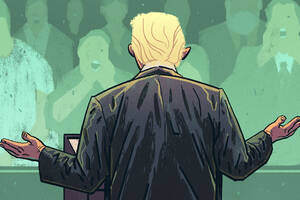“Do you swear to tell the truth, the whole truth, and nothing but the truth?”
It’s a phrase Kellogg School Professor David Austen-Smith says people hear so often in fictional courtroom dramas that the three parts of the question are rarely, if ever, considered separately in real life. But they should be, he says, because they are logically distinct in important ways that have implications for business leaders as well as lawyers.
Incentives to share or suppress information arise in a range of small-group deliberations, from one-on-one conversations to corporate committees, juries and Congressional hearings. The factors behind the half-truths, truth modifications and cheap talk are the focus of the Earl Dean Howard Distinguished Professor of Political Economy’s current research.
Austen-Smith says the application of his findings essentially comes down to this: “You had better be very careful designing your committees because doing so will affect how decisions are made. The rules under which people vote influence the way they speak and what they say,” he explains.
An economist by training, Austen-Smith earned his doctorate in economics at the University of Cambridge in 1978 and since then has taught positive political theory, social choice and microeconomics, while also authoring two books and more than 50 articles on those topics. His grant work over the last two and a half decades has been largely focused on general elections and voting theory. Among other topics, he’s also analyzed informational lobbying, proportional representation and debate in politics. He joined Northwestern University in 1996 and renewed his interest in smaller groups and the influence of voting rules in those settings.
“This research links to what we teach at Kellogg in corporate crisis management and values-based leadership. I’m looking to determine the moving parts that affect communication choices,” Austen-Smith says. “We know everyone has private information regarding their motives and preferences, but we don’t know what each person’s is. The way to influence people’s decisions is to change their beliefs, but to assume that everyone is going to share this information openly is not useful.”
Comparing majority rule and unanimity voting rules, Austen-Smith, in joint work with Professor Tim Feddersen, chair of the Kellogg Managerial Economics and Decision Sciences Department, has found that people are more willing to share their private information with others in committees that use majority rather than unanimity rule. Unlike majority rule, unanimity rule gives each individual veto power. Austen-Smith says that this ability to enforce the status quo unilaterally can result in individuals feeling less compelled to share information. “Majority rule can lead people to reveal more information. With unanimity, the deliberations will frequently not be as informed.” This result runs counter to a common intuition that requiring a consensus decision induces people to share more information and make better arguments.
Is it a good idea to begin by requiring committee members to reveal their private interests or biases with respect to any committee decision? Surprisingly, Austen-Smith and Feddersen’s research does not support this strategy.
“If I know I am in the minority on a committee, then I have no reason to share any useful information, since that can only benefit the majority,” says Austen-Smith. “But if I think I might be in the majority, then I do have a reason to share what I know with others.”
The Kellogg professor highlights an example of another challenge in how groups share information — in this case with the public — by pointing out the selective information sharing, or truth-filtering, in the tobacco industry’s past communication strategies.
“In the early days, executives announced research findings to assure consumers that cigarette smoking did not cause cancer. The research findings shared may have been accurate, but the industry also chose not to share its entire research, which revealed smoking in fact does cause cancer,” he notes.
The industry’s claims later fell apart when, over the years, smoking-related cancers increased significantly and third-party research exposed the industry’s initial position as representing only part of the truth.
Austen-Smith says that in crisis situations, some decisions to withhold important facts are made by individuals who mistakenly assume this omission is what the committee majority prefers. Because a lack of information shared in deliberations affects the outcomes reached by committees, Austen-Smith hopes his research helps business leaders develop tools to gather the whole truth most effectively.


